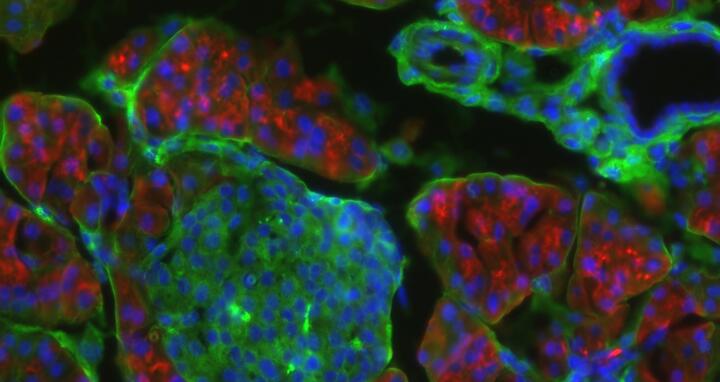Reprogramming Liver Cells into Pancreas Cells - New European Research Grant for Diabetes Researcher Dr. Francesca Spagnoli of the MDC
Diabetes affects more than 350 million people worldwide. In these patients, the insulin-producing beta cells of the pancreas have been destroyed or are dysfunctional, causing blood glucose levels to rise. In individuals with type 1 diabetes, the beta cells have been destroyed due to a misguided response of the immune system. These people must inject insulin throughout their whole life. People with type 2 diabetes are not able to utilize insulin properly, but can be treated with a special diet and drugs. However, even in these individuals, beta cell-function may decline over time, so that they, too, may need to inject insulin.
Insulin replacement therapy, however, has adverse side effects. This is why physicians have been trying for a long time to transplant intact beta cells or whole pancreas organs, but with little success. According to Dr. Spagnoli, there are several reasons for this. One is a shortage of donors; another is that the transplanted organ or cells frequently do not function well. After five years the patients often need a new transplant or have to inject insulin again.
Dr. Francesca Spagnoli (Photo: David Ausserhofer/Copyright: MDC)
Therefore, researchers are now focusing on cell-based therapy, which in their view represents the most promising option. Different potential sources for new beta cells are currently being explored, including embryonic stem cells and other cell types. A particularly attractive therapeutic strategy is to convert liver cells of diabetic patients into functional pancreatic beta cells through reprogramming. “Both organs derive from the same region in the embryo, and both play an important role in metabolism and in blood glucose regulation,” Dr. Spagnoli explained. “Moreover, they share a number of genes.” Her research has led to the identification of a novel factor that converts mouse liver cells into pancreatic cells. With her ERC PoC grant she wants to extend these findings to human liver cells and assess whether this strategy may be exploited to develop a cell-based therapy for diabetes using a patient’s own liver cells, a so-called autologous cell-based therapy. An application to patent Dr. Spagnoli’s discovery has been filed at the European Patent Office in Munich.
*According to the ERC from Thursday, February 5, 2015, a total of 120 researchers have received this grant in 2014. They were selected from 442 applicants.
Contact
Barbara Bachtler
Press Department
Max Delbrück Center for Molecular Medicine (MDC) Berlin-Buch
in the Helmholtz Association
Robert-Rössle-Straße 10; 13125 Berlin; Germany
Phone: +49 (0) 30 94 06 - 38 96
Fax: +49 (0) 30 94 06 - 38 33
e-mail: presse@mdc-berlin.de
http://www.mdc-berlin.de/en






